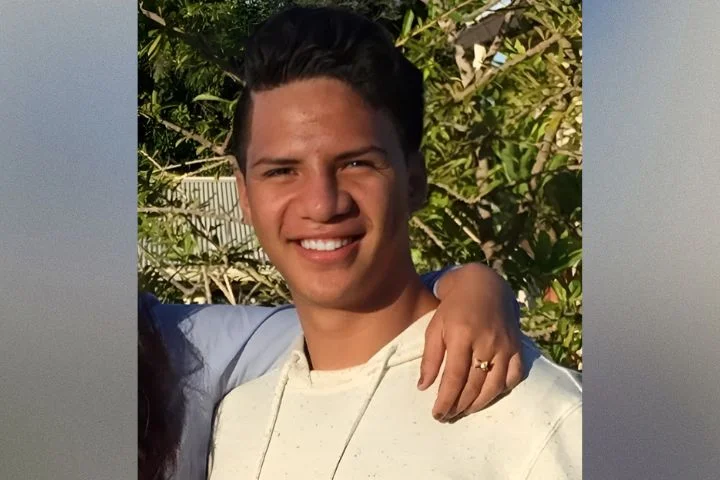18-year-old Daylenn Pua, known as “Moke”, went missing on February 27, 2015, when he was last seen boarding a bus in Waianae, Oahu in Hawaii. He was visiting Oahu from the Big Island and told his grandmother that he planned to hike the prohibited area called the Haiku Stairs, also known as the “Stairway to Heaven”. She quickly told him not to go as it was dangerous and illegal to go there.
Moke posted several pictures on social media from his phone during his hike, and one photo showing a mysterious man stood out.
He never returned from the Stairs. Was the mystery man responsible? Did he fall to his d*eath on the dangerous steps, or did something else happen that day?
No sign of Moke Pua has been found in the many years since his disappearance—no remains, clothing or other clues.
Who was Daylenn Pua?
Moke lived in South Kona, a district on the Big Island of Hawaii, known for its Kona coffee and the Ironman World Championship Triathlon location. The term “Kona” sometimes refers to its largest town, Kailua-Kona.
He was an aspiring pastry chef and hoped to continue to culinary school after graduating. He had two other siblings who also attended the same high school where he was a senior, Ke Kula ‘O Ehunuikaimalino, a Hawaiian immersion school in Kealakekua.
He had many friends and enjoyed spending time on the beach, photography, hiking and swimming.
What are the Haiku Stairs?
The Haʻikū Stairs, also known as the “Stairway to Heaven”, is a steep, 3,922-step steel structure providing foot access to former U.S. Navy communication facilities on the island of Oʻahu in Hawaii. The pathway spans the Oahu’s Ko’olau mountain range, with views from the top to Kaneohe and Kaneohe Bay.
History and construction of the Haʻikū Stairs
Building the US Naval Radio Station in Haʻikū Valley was one of the most complex projects of World War 2 in the Pacific theater. The facility was classified as top secret, and there was no actual model to follow for engineering construction, as it had never been done before. It was also hazardous to construct as the terrain was extremely rugged. The groundbreaking design and construction of the Naval Radio Station is a testament to the courage and ingenuity of military and civilian personnel under the pressure of war. Once operational, the low-frequency radio system at Ha’ikū could send messages to submarines as far away as Tokyo Harbor.
Along with the shortage of workers and materials, there was also anxiety in Hawaii following the a*ttack on Pearl Harbor on December 7, 1941.
Construction began in 1942 to create an antennae system that reached almost 3,000 feet across. However, the valley was covered with dense vegetation, large lava rocks, and huge intertwined hau trees.
Beyond clearing the valley, the most significant problem facing the construction of the radio station was finding a way to send men to the top of the cliffs. In many places, the cliffs that semi-encircle the valley range between 1,800 and 2,850 feet, rising almost vertically. To add to the difficulties was the fact that the dirt was often either crumbly lava or was muddy and unstable from the high rainfall and fog.
The contractors had considered sending back to the mainland for professional high-scalers when it was discovered that two such high-scalers were working on another challenging military project in nearby Red Hill. The two men, Bill Adams and Louis Otto, under the leadership of rigger Ray Cotherman, were known for their fierce determination and courage in conquering the heights. They began their climb up the steep slopes with one coil of rope, a rock pick sledgehammer, and some three-foot steel pins. It took Bill Adams and Louis Otto 21 days to scale 2,800 feet to the peak of Pu’u Keahiakahoe on Ha’ikū Valley’s eastern wall.
Construction battalion forces later completed certain portions of the work, including “installation of the 600-KW diesel standby generator in the bombproof transmitter building, installation of several poles on the transmitter building on the Pali summit, and installation of a short length of underground cable.”
The US Naval Radio station at Haʻikū Valley satisfied two requirements of the war. It allowed for long-range transmission and was built in a position that allowed excellent defence from enemy at*tack. The project was completed in December 1943, and over the 200 KW Alexanderson Alternator at Haiku messages to merchant ships, weather reports to naval vessels and despatches to submarines were broadcast.
Some remnant parts of the wooden ladder may still be seen beside the metal steps. The radio station was commissioned in 1943.
The Naval base was decommissioned in the 1950s, and the U.S. Coast Guard used the site for an Omega Navigation System station. In the mid-1950s, the wooden stairs were replaced by sections of metal steps and ramps, and the station and trail were officially closed to the public in 1987.
The disappearance of Daylenn Pua
Moke lived on the Big Island. but was visiting his grandmother, Martha Bear, in Waianae.
He was interested in hiking up the Stairway to Heaven, and Martha told her grandson that it was closed down and authorities were not letting anybody climb the mountain due to safety concerns.
On Friday morning, February 27, 2015, Pua left his grandmother’s home and boarded a bus from Waianae, Oahu, never to return. He was wearing a white long-sleeved t-shirt, black surf shorts, and slippers and carrying a red backpack.
Pua had been planning on hiking the stairs for a while. He posted a picture of the stairs on February 25, 2015, with the caption: “Stairway to Heaven… hiking this insane hike tomorrow. Wish me luck.”
The final Facebook post on his account was on February 26, 2015, saying, “And the hike begins #haiku.”
There is a discrepancy in the dates in the media as it is widely reported that Pua went missing on February 27, 2015, the day that he was meant to have gotten on the bus. Yet his last Facebook post says he started hiking the Stairway to Heaven on February 26. So either he postponed his hike for a day, or the date of the disappearance is inaccurate.
It’s possible that he went hiking on the 26th and didn’t return, and after 24 hours, the police department filed him as a missing person on February 27. He was reported missing by his grandmother when he failed to come home, and this was the 27th, one day after the hike.
The mystery man
Honolulu police said Pua texted pictures of himself indicating he was on the trail of the Haiku Stairs at around 11.00 am despite what he’d told his grandmother. He hasn’t been seen or heard from since.
The family extensively studied these pictures, looking for clues, and they found a man, barely visible in the background, lurking in the bushes in one of Pua’s pictures. They believed perhaps the mysterious man was following Pua.
Who was this mystery individual? Was he just an innocent bystander and just happened to be captured in the photo? Was he relieving himself in the bushes? Did Moke even ever realize he was not alone on the mountain with this man? Why hasn’t he come forward (some accounts say yes, but this is unconfirmed by the authorities)? Did he not want to admit to climbing what is technically an illegal trail?
Perhaps this is just a red herring, but interestingly, Moke took a photo of him.
The search for Daylenn Pua
The search effort involved the Honolulu Fire Department (HFD), local volunteers, family, drone operators, and even the U.S. Navy. Helicopter pilots donated their time to fly around and search the Haʻikū Valley with Moke’s father on board, calling out his name over the sound of the rotor blades.
The poor weather, with lots of rain, made climbing the Haʻikū Stairs difficult and the surrounding steep areas almost impossible.
Some hikers reported hearing cries for help on the Monday following the disappearance, extending the fire department’s search to Tuesday, March 3, 2015, when the official investigation was suspended at 4.44 pm. Relatives and local volunteers continued to comb the area for any signs until March 5, with some even rappelling down the extremely steep and dangerous cliffs to check the end of the Kulana’ahane Trail, the location of Daylenn’s last picture.
In a Reddit post from 2015, someone called Dclandry, said:
“A lot of people have their information mixed up. I could never explain to you the feeling I felt when you hear a cry like that. The hiker did not trust pass and go up the stairs. By the looks of the photographs, he didn’t even make it to the stairs. The hiker went up the Moanalua way. I’m not a local so I don’t really know any of the name of the ridges, all I can do is try my best to explain to others where we went and where it was that we heard him. We started the hike on on a trail about 20 feet from the Kulana’ahane trail. We had hiked about three hours up. We were yelling to each other to make sure the others were okay because we were so far apart. The wind died down for just a half a second and we hear a scream “help me!” It shook my up so bad that I had to sit down to even call 911. My friends were about 50 yards in front of me and little did I know, they were also calling 911. All 5 of us heard it at the same time. If we were going straight at the trail, the voice was coming from the left. It was coming from down below. It did not seem as if it was echoing nor did it seem very far away. The scary thing is is that after about an hour,once the rescuers were there, my friend and I were bound and determined to get to the top of the stairs so we decided to continue one, and the other three stayed where they were. As we were continuing at the ridge we could hear the firemen/rescuers down below whistling and calling for him. Again, the wind died just a tad and we heard “I’m down here!” My friend and I both stopped in our tracks and started screaming for him. It was not the rescuers. The voice was different than The calls from the rescuers. I immediately called 911 again. We stayed up there for about another hour without moving to try and listen for him again. The wind was so bad and the clouds are starting to roll in so it was hard to hear anything.
My friend and I that heard the last cry, are heading up the ridge tomorrow the same way that we went Monday. It’s hard to explain where the location was that we heard it, as well as where the voice was coming from. So in an effort to find him were going back tomorrow when I get off of work at 7.30am.”
But nothing was found. It was baffling for the authorities, friends and volunteer searchers.
The Authorities concluded that Daylenn had slipped and fallen to his de*ath somewhere along the ‘Stairway to Heaven’ path. Daylenn Pua remains missing to this day, and no trace of him has ever been found.
What happened to Daylenn Pua?
No remains have ever been found, so people have theorized what might have happened. Heavy rains during the search hampered the use of tracker dogs or trackers who might’ve otherwise been able to follow his scent.
Accident
The Stairway to Heaven is dangerous, which was why it was closed to the public, a fact that Pua ignored. The stairs suffered considerable damage from a landslide in early February 2015. Some hikers were stranded after the landslide and had to be rescued on February 16, a week before Pua attempted the climb. After the landslide, the steps were even more dangerous and unstable, and with sheer drops on either side of the stairs, a slip could easily have been fatal. But, strangely, a body has never been found despite vast amounts of searching in the years since Daylenn vanished. Did a secondary landslide perhaps bury him?
At*tacked
Did Daylenn Pua fall victim to foul play, as his family believe? The Honolulu Police Department examined the mystery man’s photo, and they put out a CrimeStoppers alert asking for any information about him.
However, no one contacted the police and his identity and purpose remain a mystery. The authorities believe it is unlikely the man was involved.
Latest developments
The stairs are currently closed and illegal to access.






